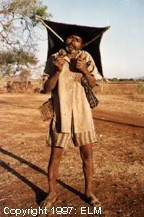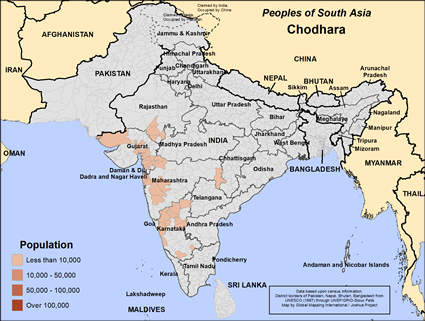Chodhara in India

Photo Source:
Bethany World Prayer Center
|

Map Source:
People Group data: Omid. Map geography: UNESCO / GMI. Map Design: Joshua Project.
|
| People Name: | Chodhara |
| Country: | India |
| 10/40 Window: | Yes |
| Population: | 8,800 |
| World Population: | 11,300 |
| Primary Language: | Chodri |
| Primary Religion: | Hinduism |
| Christian Adherents: | 0.17 % |
| Evangelicals: | 0.00 % |
| Scripture: | New Testament |
| Ministry Resources: | No |
| Jesus Film: | Yes |
| Audio Recordings: | Yes |
| People Cluster: | South Asia Tribal - other |
| Affinity Bloc: | South Asian Peoples |
| Progress Level: |
|
Introduction / History
The Bhil are the third largest and most widely distributed tribal group in India. Although the Bhil were once thought of as a single tribe, it is now clear that they consist of many subgroups, one of which is the Chodhara. The name "Bhil" was probably derived from the word villu or billu, which in most Dravidian languages is the word for "bow. " The bow has long been a characteristic weapon of the Bhil because the tribesmen always carry their bows and arrows with them. Many years ago, Bhil rajas (kings) permitted immigrants from the plains to settle in the hill regions. To safeguard their independence and rule, the Bhil fought against powerful Empires: the Moghals, the Maratha and the British Raj. The Chodhari Bhil live mainly in the Broach and Dangs districts of southeastern Gujarat, West India. They are divided into five sub-groups, each of which marries within its own class. The Chodhari, like other Bhil, are related to the Rajput. They speak Chodri, a Bhil language.
What Are Their Lives Like?
The Chodhari are inclined to deny their ancient customs by trying to mold their lifestyles after the Hindus. They may intermarry with those of higher classes and participate in festivals alongside the Hindus who live nearby. They revere a Hindu goddess named Devi, who supposedly brought moral, social and health reforms, including vegetarianism to the people. Such reforms caused division within a group called the Sargelas, who taught that all products of nature are created by God and should be accepted as food. The Sargelas had much influence on the Chodhari, and today most of them eat meat. The Chodhari are not aggressive and use weapons only for hunting or defending themselves against robbers or wild animals. They are generally known to be honest, uninhibited, simple, likable people. Most of the Chodhari work as small-time farmers. Cotton, vegetables and rice are their principal crops. These are taken to the weekly markets, where they are traded for clothing, tools, and jewelry. They obtain supplementary foods by hunting, fishing and collecting produce from the woods. The women and children are also employed, working for the wealthier landowners. Chodhari craftsmen such as carpenters and weavers are better off economically than those who farm. Customarily, the Chodhari only marry people within their own group (even different castes); and they are permitted to marry outside their direct clans. Most marriages are monogamous, and the line of descent is through the father. Premarital sexual relations are not allowed among the Chodhari. If a young couple wishes to marry but cannot afford the bride price, it is common for the girl to be willingly abducted by the young man. They return home after several months and have their union sanctioned.
What Are Their Beliefs?
The great majority of the Chodhari Bhil practice ethnic religions, such as animism (belief that non-human objects have spirits) and ancestor worship (praying to deceased ancestors for guidance). They build stone memorials for dead ancestors. They believe in the gods of the hills, the clouds and the wind. They also worship a god known as Mehta, whom they believe inhabits such things as whirlwinds, thunder, lightning, and earthquakes. Mehta lives in the sea, on riverbanks and in animals. The Chodhari Bhil believe that the spirit of a person who died an unnatural or violent death will possess the body of a witch.
What Are Their Needs?
There is a need for Christian believers who are filled with the fruit of the Holy Spirit to share God's love with the Chodhari Bhil. Prayer is the first step toward seeing them reached with the truth of the gospel.
Prayer Points
Pray for gospel workers to catch a vision for reaching the Chodhari Bhil people for Jesus and that in God's sovereign timing their hearts would be open and ready to follow him. Pray for Jesus movements to bless extended families so the gospel will spread rapidly among this people group. Pray for the spiritual lives of the Chodhari Bhil people to become fruitful as they follow Christ. Pray for the lives and culture of the Chodhari Bhil people to evidence the rule and reign of the Kingdom of God as they open to the gospel, and for the beauty of Jesus to be seen in them.